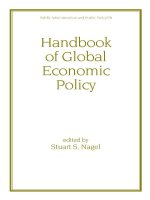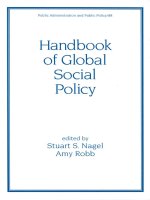Handbook of Global Social Policy pot
Bạn đang xem bản rút gọn của tài liệu. Xem và tải ngay bản đầy đủ của tài liệu tại đây (28.25 MB, 445 trang )
Handbook
of
Global
Social
Policy
PUBLIC ADMINISTRATION
AND
PUBLIC POLICY
A
Comprehensive Publication Program
Executive Editor
JACK
RABIN
Professor of Public Administration and Public Policy
School of Public Affairs
The Capital College
The Pennsylvania State University-Harrisburg
Middletown, Pennsylvania
1.
Public Administration as a Developing Discipline (in
two
parts), Robert
T.
2.
Comparative National Policies
on
Health Care, Milton
I.
Roemer,
M.D.
3.
Exclusionary Injustice: The Problem
of
lllega/ly Obtained Evidence, Steven
4.
Personnel Management in Government: Politics and Process, Jay
M.
5.
Organization Development in Public Administration (in two parts), edited by
6. Public Administration: A Comparative Perspective, Second Edition, Revised
7. Approaches to Planned Change
(in
two parts), Robert
T.
Golembiewski
8.
Program Evaluation at H€W(in three parts), edited by James G. Abert
9.
The States and the Metropolis, Patricia
S.
Florestano and Vincent L.
Marando
10. Personnel Management in Government: Politics and Process, Second Edi-
tion, Revised and Expanded, Jay
M.
Shafritz, Albert
C.
Hyde, and David
H.
Rosenbloom
1 1. Changing Bureaucracies: Understanding the Organization Before Selecting
the Approach, William A. Medina
12. Handbook on Public Budgeting and Financial Management, edited by Jack
Rabin and Thomas
D.
Lynch
13.
bcyclopedia
of
Policy Studies, edited by Stuart
S.
Nagel
14. Public Administration and Law: Bench v. Bureau in the United States, David
H. Rosenbloom
15. Handbook on Public Personnel Administration and Labor Relations, edited
by Jack Rabin, Thomas Vocino, W. Bartley Hildreth, and Gerald
J.
Miller
16. Public Budgeting and Finance: Behavioral, Theoretical, and Technical Per-
spectives, Third Edition, edited by Robert T. Golembiewski and Jack Rabin
17. Organizational Behavior and Public Management, Debra
W. Stewart and G.
David Garson
18. The Politics
of
Terrorism: Second Edition, Revised and Expanded, edited by
Michael Stohl
Golembiewski
R. Schlesinger
Shafritz, Walter
L.
Balk, Albert C. Hyde, and David H. Rosenbloom
Robert
T.
Golembiewski and William
B.
Eddy
and Expanded, Ferrel Heady
4
i
19. Handbook of Organization Management, edited by William B. Eddy
20. Organization Theory and Management, edited by Thomas D. Lynch
21. Labor Relations in the Public Sector, Richard C. Kearney
22. Politics and Administration: Woodrow Wilson and American Public Ad-
ministration, edited by Jack Rabin and James
s.
Bowman
23. Making and Managing Policy: Formulation, Analysis, Evaluation, edited by
G.
Ronald Gilbert
24. Public Adminisfration: A Comparative Perspective, Third Edition, Revised,
Ferrel Heady
25. Decision Making in the Public Sector, edited by Lloyd
G. Nigro
26. Managing Administration, edited by Jack Rabin, Samuel Humes, and Brian
S.
Morgan
27. Public Personnel Update, edited by Michael Cohen and Robert T. Golem-
biewski
28. State and Local Government Administration, edited by Jack Rabin and Don
Dodd
29. Public Administration: A Bibliographic Guide to the Literature, Howard E.
McCurdy
30. Personnel Management in Government: Politics and Process, Third Edition,
Revised and Expanded, Jay M. Shafritz, Albert C. Hyde, and David H.
Rosenbloom
31. Handbook of Information Resource Management, edited by Jack Rabin and
Edward M. Jackowski
32. Public Administration in Developed Democracies: A comparative Study,
edited by Donald C. Rowat
33. The Politics
of
Terrorism: Third Edition, Revised and Expanded, edited by
Michael Stohl
34. Handbook on Human Services Administration, edited by Jack Rabin and
Marcia
B.
Steinhauer
35. Handbook of Public Administration, edited by Jack Rabin, W. Bartley
Hildreth, and Gerald J. Miller
36. Ethics for Bureaucrats: An Essay on Law and Values, Second Edition,
Revised and Expanded, John A. Rohr
37. The Guide to the Foundations of Public Administration, Daniel W. Martin
38. Handbook of Strategic Management, edited by Jack Rabin, Gerald J. Miller,
and W. Bartley Hildreth
39. Terrorism and Emergency Management: Policy and Adminisfration, William
L. Waugh, Jr.
40. Organizational Behavior and Public Management: Second Edition, Revised
and Expanded, Michael L. Vasu, Debra
W.
Stewart, and G. David Garson
41. Handbook
of
Comparative and Development Public Adminisfration, edited by
Ali Farazmand
42. Public Administration: A Comparative Perspective, Fourth Edition, Ferrel
Heady
43. Government Financial Management Theory, Gerald J. Miller
44. Personnel Management in Government: Politics and Process, Fourth Edition,
Revised and Expanded, Jay M. Shafritz, Norma M. Riccucci, David H.
Rosenbloom, and Albert C. Hyde
45. Public Productivity Handbook, edited by Marc Holzer
46. Handbook
of
Public Budgeting, edited by Jack Rabin
47. Labor Relations in the Public Sector: Second Edition, Revised and Ex-
panded, Richard
C.
Kearney
48. Handbook
of
Organizational Consultation, edited by Robert
T.
Golembiewski
49. Handbook
of Court Adminisfration and Management, edited by Steven W.
50.
Handbook
of
Comparative Public Budgeting and Financial Management,
51.
Handbook
of
Organizational Behavior, edited by Robert T. Golembiewski
52. Handbook
of
Administrative Ethics, edited by Terry L. Cooper
53. Encyclopedia
of
Policy Studies: Second Edition, Revised and Expanded,
54. Handbook
of
Regulation and Administrative Law, edited by David H.
55.
Handbook
of
Bureaucracy, edited by Ali Farazmand
56. Handbook
of
Public Sector Labor Relations, edited by Jack Rabin, Thomas
Vocino,
W. Bartley Hildreth, and Gerald J. Miller
57. Practical Public Management, Robert T. Golembiewski
58. Handbook
of
Public Personnel Administration, edited by Jack Rabin, Thomas
59. Public Administration: A Comparative Perspective, Fifth Edition, Ferrel
60. Handbook
of
Debt Management, edited by Gerald J. Miller
61. Public Administration and Law: Second Edition, David H. Rosenbloom and
62. Handbook
of
Local Government Adminisfration, edited by John J. Gargan
63. Handbook ofAdminisfrative Communication, edited by James L. Garnett and
64. Public Budgeting and Finance: Fourth Edition, Revised and Expanded,
65. Handbook of Public Adminisfration: Second Edition, edited by Jack Rabin,
66. Handbook
of
Organization Theory and Management The Philosophical
67. Handbook of Public Finance, edited by Fred Thompson and Mark T. Green
68. organizational Behavior and Public Management: Third Edition, Revised and
Expanded, Michael
L.
Vasu, Debra W. Stewart, and G. David Garson
69. Handbook
of
Economic Development, edited by Kuotsai Tom Liou
70. Handbook of Health Administration and Policy, edited by Anne Osborne Kil-
71. Handbook of Research Methods in Public Administration, edited by Gerald
J.
72. Handbook on Taxation, edited by W. Bartley Hildreth and James A. Richard-
73. Handbook of Comparative Public Administration in the Asia-Pacific Basin,
74. Handbook
of Global Environmental Policy and Administration, edited by
75. Handbook of State Government Administration, edited by John J. Gargan
76. Handbook of Global Legal Policy, edited by Stuart
S.
Nagel
77. Handbook of Public lnformafion Systems, edited by G. David Garson
78. Handbook
of
Global Economic Policy, edited by Stuart
S.
Nagel
79. Handbook
of
Strategic Management: Second Edition, Revised and Ex-
panded, edited by Jack Rabin, Gerald J. Miller, and W. Bartley Hildreth
80.
Handbook of Global lnternational Policy, edited by Stuart
S.
Nagel
Hays and Cole Blease Graham, Jr.
edited by Thomas D. Lynch and Lawrence L. Martin
edited by Stuart
S.
Nagel
Rosenbloom and Richard D. Schwartz
Vocino,
W. Bartley Hildreth, and Gerald
J.
Miller
Heady
Rosemary O’Leary
Alexander Kouzmin
edited by Robert T. Golembiewski and Jack Rabin
W. Bartley Hildreth, and Gerald J. Miller
Approach, edited by Thomas
D.
Lynch and Todd
J.
Dicker
I
patrick and James
A.
Johnson
Miller and Marcia L. Whicker
son
edited by Hoi-kwok Wong and Hon
S.
Chan
Dennis
L.
Soden and Brent
S.
Steel
81.
Handbook of Organizational Consultation: Second Edition, Revised and
82.
Handbook of Global Political Policy, edited by Stuart
S.
Nagel
83.
Handbook of Global Technology Policy, edited by Stuart S. Nagel
84. Handbook of Criminal Justice Administration, edited by Toni DuPont-
85.
Labor Relations in the Public Sector: Third Edition, edited by Richard C.
86.
Handbook of Administrative Ethics: Second Edition, Revised and Expanded,
87.
Handbook of Organizational Behavior: Second Edition, Revised and Ex-
88.
Handbook of Global Social Policy, edited by Stuart
S.
Nagel and Amy Robb
Expanded, edited by Robert
T.
Golembiewski
Morales, Michael K. Hooper, and Judy H. Schmidt
Kearney
edited by Terry
L. Cooper
panded, edited by Robert
T.
Golembiewski
Additional Volumes
in
Preparation
Handbook of Public Quality Management, edited by Ronald J. Stupak and
Peter M. Leitner
Handbook of Crisis and Emergency Management, edited by Ali Farazmand
Handbook of Public Management Practice and Reform, edited by Kuotsai
Tom Liou
Handbook of Comparative and Development Public Administration: Second
Edition, Revised and Expanded, edited by Ali Farazmand
Principles and Practices of Public Administration [on-line text], edited by Jack
Rabin, Robert Munzenrider, and Sherrie Bartell
Public Administration: A Comparative Perspective, Sixth Edition, Revised
and Expanded, Ferrel Heady
Personnel Management in Government: Politics and Process, Fifth Edition,
Jay
M.
Shafritz, Norma M. Riccucci, David
H.
Rosenbloom, Katherine C.
Naff, and Albert
C.
Hyde
ANNALS
OF
PUBLIC ADMINISTRATION
1.
Public Administration: History and Theory in Contemporary Perspective,
2.
Public Administration Education in Transition, edited
by
Thomas Vocino and
3.
Centenary Issues
of
the Pendleton Act of 1883, edited
by
David H. Ro-
4.
lntergovernrnental Relations in the
1980s,
edited by Richard
H.
Leach
5.
Criminal Justice Administration: Linking Pracfice and Research, edited
by
edited
by
Joseph
A.
Uveges,
Jr.
Richard Heimovics
senbloom with the assistance
of
Mark
A.
Emmert
William
A.
Jones,
Jr.
Handbook
of
Global
Social
Policy
edited
by
Stuart
S.
Nagel
Amy
Robb
University
of
Illinois
Urbana, Illinois
MARCEL
MARCEL DEKKER,
INC.
DEKKER
NEW
YORK BASEL
ISBN:
0-8247-0357-X
This book is printed on acid-free paper.
Headquarters
Marcel Dekker, Inc.
270 Madison Avenue, New York, NY 10016
tel: 212-696-9000; fax: 212-685-4540
Eastern Hemisphere Distribution
Marcel Dekker AG
Hutgasse
4,
Postfach 812, CH-4001 Basel, Switzerland
tel: 41-61-261-8482; fax: 41-61-261-8896
World Wide Web
The publisher offers discounts on this book when ordered in bulk quantities. For more
information, write to Special SalesIProfessional Marketing at the headquarters address
above.
Copyright
0
2001
by Marcel Dekker, Inc. All Rights Reserved.
Neither this book nor any part may be reproduced or transmitted in any form
or
by any
means, electronic or mechanical, including photocopying, microfilming, and recording,
or by any information storage and retrieval system, without permission in writing from
the publisher.
Current printing (last digit):
10987654321
PRINTED IN THE UNITED STATES
OF
AMERICA
-
"-
"
b
"
To
the people who especially stimulated
my awareness
of
social policy, including:
Emory Bogardus, Helen Clarke, John Cuber,
Ruth Gavian, Clair Wilcox, and Kimball Young.
This Page Intentionally Left Blank
P
ref
ace
This handbook
on
global social policy is one in a set
of
six global policy hand-
books. The other five deal with economic, technology, political, international,
and legal policy.
Public policy studies in the past have tended to emphasize domestic policy
rather than cross-national policy. This has been especially true of American pol-
icy studies, which tend to be especially nation-bound. This is also true, to some
extent, of policy studies in France, Russia, China, Brazil, and elsewhere.
When American policy studies show an interest in other countries, those
other countries tend to be exclusively Western European. This six-volume set,
however, will include all the regions
of
the world-Africa, Asia, Eastern and
Western Europe, Latin America, and North America.
Public policy studies also tend to place a great deal of emphasis
on
methods
of
analysis and the policy process. They do not get much into substance, espe-
cially at the professional or scholarly level, as contrasted to undergraduate text-
books. That
is
so
because scholars have traditionally considered substance to be
not as philosophical or theoretical as methods or process.
In this six-volume set, however, each volume
is
devoted to a different sub-
stantive field, including economic, technology, social, political, international, and
legal policy. The discussions are more theoretical than most substantive discus-
sions because they emphasize comparisons across places, across times, and across
substantive fields. Furthermore, the discussions are practical in terms
of
applica-
bility to real-world problems.
Scholars and others who study comparative government unfortunately tend
to overemphasize such structures as federalism, separation of powers, legisla-
V
vi
Preface
tures, chief executives, and supreme courts while neglecting public policy, which
this series emphasizes.
Comparative government scholars also tend to emphasize area studies,
which involve specialization in a single country or subregion, as contrasted to
this set of volumes, which cuts across six regions and six policy fields.
Thus, the key objective of these volumes is to encourage more cross-
national and cross-policy research and applications. The set not only advocates
more of this kind of research but practices what it advocates by providing almost
200
studies in six volumes, averaging about
30
studies each. This set of hand-
books
should be a landmark in the disciplines of both public policy studies and
cross-national studies.
Stuart
S.
Nagel
Contents
Preface
Contributors
I
General Social Policy
1. Social Policy: An Introduction
Stunrt
S.
Nngel
1?
xi
1
2.
Ethnic Nepotism as an Explanation for Ethnic Conflicts
19
Tatu Vanhur~en
3.
Differences in the Determinants of Internal Conflict Between
the Cold War and Post-Cold War Periods
33
Hae
S.
Kim
4.
Religion: For or Against Democracy?
Mirn Mnrody
51
5. Recasting Foreign Policy Analysis Using a Gender Analysis:
Where to Begin?
59
Deborah Stiemtra
6.
Political Rights, Electoral Systems, and the Legislative
Representation of Women in
73
Democracies:
A Preliminary Analysis
Wiha
Rule
73
vii
"".".""."""
"""".""
"-
viii
Contents
I1 Africa’s Social Policy
7. Ethnicity, Democracy, and Conflict Management in Africa 93
Victor Azalva
8. The Role of Mass Communication in Egyptian Family
Planning Policy 109
Annanv A. Khodair
and
Stever1 K. Wisensale
I11 Asia’s Social Policy
9.
10.
11.
12.
13.
14.
15.
Coexistence of Secularism and Fundamentalism in India 123
Pelgy Vaz
Caste and Class Relations in Bihar 135
Sllymn Nand Sirzgh
Identity Collapse and Ethnic Politics: A Sri Lankan Example 147
William W. Bostock
Politics of Agenda-Building in South Korea: Imperial
Japan’s Military Sexual Slavery Case 163
Bat1g-Soon
YOOU
Public Participation in China’s Urban Development 183
Tingwei Zhang
Social Development Amidst Economic Reform: Family
Policy in a Changing Vietnam 209
Steven K. Wiserzsale
Nations and Minorities: A Conceptual Comparison
Between the Western and the Islamic Understanding with
a Case Study 22 1
Andrea K. Rierner
IV Europe’s Social Policy
16. Russian Nationalism and Nation-Building in the Russian
Federation: Implications for Russian Foreign Policy in the
Near Abroad 245
Susnrzne
M.
Bir-gerson
and
Roger
E.
Kanet
17. Forming a New Nation-State and the Repression or
Protection of Ethnic Minorities: The Case of Slovenia 267
Miran Komac
Contents
18.
19.
20.
21.
Freedom Versus Equality? Some Thoughts About Attitudes
Toward Gender Equality Politics in Eastern and
Central Europe
Vlastcl Jahiiic‘
Conceptualizing the German State: Putting Women’s
Politics in its Place
Birgit Sauer
The Limits
of
Tolerance in a Liberal Society: In Search
of
Guidelines
Marlies Galenkamnp
Back from the Edge: Rebuilding a Public Heritage-A Case
Study
of
Dubrovnik, Croatia
Linda
K.
Richter
and
William
L.
Richter
V
Latin
and
North America’s Social Policy
22.
Human Rights, Civil Society, and the Guatemalan
Peace Process
Scott Turner
23. Managing Diversity in Multiethnic Federations: The Case
of
Canada
Rkjeamz Pelletier
Zmldex
ix
297
3 17
337
357
373
397
41
5
This Page Intentionally Left Blank
Contributors
Victor Azarya
Professor, Department of Sociology and Anthropology,
Harry
S
Truman Research Institute for the Advancement of Peace, The Hebrew Univer-
sity of Jerusalem, Jerusalem, Israel
Susanne
M.
Birgerson
Independent Scholar, Slavic and East European Li-
brary, University of Illinois, Urbana, Illinois
William W. Bostock
Senior Lecturer, School of Government, University
of
Tasmania, Hobart, Tasmania, Australia
Marlies Galenkamp
Associate Professor, Department
of
Law (Jurisprudence
and Legal Philosophy), Erasmus University, Rotterdam, The Netherlands
Vlasta JaluiiE
Assistant Professor of Political Science, The Peace Institute,
Ljubljana, Slovenia
Roger
E.
Kanet
Professor and Dean, School of International Studies, Univer-
sity
of
Miami, Coral Gables, Florida
Amany
A.
Khodair
Senior Lecturer, Political Science Department, Suez Canal
University, Ismailia, Egypt
xi
xii
Contributors
I
Hae
S.
Kim
Professor, Department of International Relations, Troy State Uni-
versity, Fort Walton Beach, Florida
Miran Komac
Associate Professor, Institute for Ethnic Studies, Ljubljana,
Slovenia
i.
,;.,
,.I,
>
.,
;
> _
__
.I
Mira Marody
Professor, Institute for Social Studies, and Institute of Sociol-
ogy, University
of
Warsaw, Warsaw, Poland
Stuart
S.
Nagel
Professor, Department of Political Science, University of Illi-
nois, Urbana, Illinois
I
R6jean Pelletier
Professor, Department of Political Science, Lava1 University,
Ste-Foy, Quebec, Canada
Linda K. Richter
Professor, Department of Political Science, Kansas State
University, Manhattan, Kansas
William
L.
Richter
Associate Provost, Office of International Programs, Kan-
sas State University, Manhattan, Kansas
Andrea
K.
Riemer
Senior Analyst, ARE Research and Consultancy Office
for Security Studies, Vienna, Austria
Wilma Rule
Adjunct Professor, Department of Political Science, University of
Nevada, Reno, Nevada
Birgit Sauer
Assistant Professor, Institute for Political Science, University of
Vienna, Vienna, Austria
Shyam Nand Singh
Associate Professor, Department
of
Political Science,
M. D.
S.
University, Ajmer, Rajasthan, India
Deborah Stienstra
Associate Professor, Department
of
Political Science, Uni-
versity of Winnipeg, Winnipeg, Manitoba, Canada
Scott Turner
Associate Professor, Department of Behavioral and Social Sci-
ences, University of Montevallo, Montevallo, Alabama
Tatu Vanhanen
Professor Emeritus, Department of Political Science, Univer-
sity of Helsinki, Klaukkala, Finland
Contributors xiii
Pelgy Vaz
Associate Professor, Department of Sociology and Social Work,
Fort Hays State University, Hays, Kansas
Steven
K.
Wisensale
Associate Professor, School of Family Studies, Univer-
sity of Connecticut, Storrs, Connecticut
Bang-Soon Yoon
Associate Professor, Department of Political Science, and
Director, Women Studies Program, Central Washington University, Ellensburg,
Washington
Tingwei Zhang
Assistant Professor, Urban Planning and Policy Program, Col-
lege
of
Urban Planning and Public Affairs, University of Illinois, Chicago, Illinois
This Page Intentionally Left Blank
Handbook
of
Global
Social
Policy
This Page Intentionally Left Blank
Social Policy
An Introduction
'
Stuart
S.
Nagel
University
of
Illinois, Urbana, Illinois
I.
INTRODUCTION
Win-win or super-optimizing analysis of public policy problems tries to find fea-
sible solutions which can enable conservatives, liberals, and other major view-
points to all come out ahead of their best initial expectations simultaneously.'
The elements in the analysis include
(1)
conservative goals and alternatives,
(2)
liberal goals and alternatives,
(3)
relations between the major alternatives and
goals,
(4)
the development of win-win solutions, and
(5)
feasibility hurdles to
overcome. The feasibility hurdles to be overcome include economic, administra-
tive, political, psychological, legal, international, and technological hurdles, and
the disruption of displaced firms and individuals.
As
applied to social policy, we
are especially talking about improving the quality of life of people at the bottom
of
the social hierarchy, but to the benefit of all. This means public policy that
relates to
(1)
employment and job facilitators,
(2)
education, financing, and inte-
gration,
(3)
merit treatment,
(4)
voting and political participation, and
(5)
crime
reduction.
The computer revolution and contemporary globalization have the potential
for generating great productivity and prosperity. They also have the potential for
generating among
so
many people more unemployment and anger than the indus-
trial revolution. This is because
so
many poverty-generating displacement factors
are operating simultaneously throughout the world. These include productivity
downsizing, free trade, defense conversion, and immigration. It also includes the
employment of many groups of people who were not formerly competing as
1
2
Nagel
I
much for the available jobs, such as women, minorities, the disabled, and the
elderly. Key objects of an antipoverty program should be to smooth the transition
of displaced workers to other possibly better jobs as well as to provide for the
transition of the poor toward middle-class status.
Being poor in this context relates partly to individual income. It is, however,
not possible to say that being poor means having less than a certain income or
being below a certain income percentile in one’s nation. One can live better at
a low income in some places in the world than others. Being in the bottom tenth
percentile in a wealthy nation may be better than being in the top tenth percentile
in an impoverished nation. Poverty should be measured in terms of food, shelter,
clothing, and medical care. A person or family is impoverished if they cannot
afford
(1)
enough food to avoid all forms of malnutrition,
(2)
enough housing
not to freeze in the winter time,
(3)
enough clothing to satisfy minimal cultural
standards
of
dignity, and
(4)
enough medical care
so
that all members of the
family have better than a
50%
probability of living to age
60.
The fourth point
illustrates how our standards keep moving up, since living to age
40
would have
been considered good in medieval times, even by royalty.
Sometimes employment and education are included in the definition of pov-
erty. Both employment and education are important for preventing poverty and
for rising out of poverty, but they are not part of the definition. They are causes
and to some extent effects of poverty. More important, they are policy variables
subject to deliberate improvements through government decision making.
II.
EMPLOYMENT
A. Conservative and Liberal Alternatives
or
Approaches
Constrained public aid refers to restrictions on eligibility, benefit levels, income
retention, and due process, partly designed to deter applications for public aid.
Generous public aid refers to broadness on those matters, partly designed to pro-
vide more dignity to the poor.
The key issues on those four matters have been
(1)
allowing an impover-
ished family that has a father and mother present to receive aid,
(2)
providing
for minimal benefit levels on a nationwide basis,
(3)
allowing recipients to keep a
certain number of earned dollars per month, and
(4)
providing hearings in welfare
disputes, including right to counsel.
B.
Win-Win Alternatives
The super-optimum solutions
(SOS)
emphasis is moving away from arguing over
those legal matters and toward upgrading skills and providing job opportuni-
ties. Doing
so
may do more for decreasing poverty than a punitive deterrence ap-









